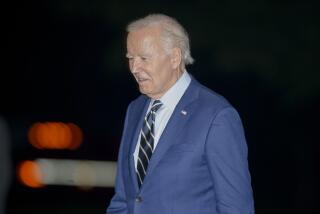Romney takes hard line on Iran in Israel speech
- Share via
JERUSALEM — On a day that mixed religious symbolism, courtship of financial donors and tough rhetoric, Mitt Romney on Sunday declared in his most aggressive tones to date that the U.S. should stand firmly behind Israel if it chooses military action to thwart Iran’s progression toward a nuclear weapon.
Flanked by several dozen Israeli and American flags, with the last glimmers of sunlight illuminating the walls of Jerusalem’s Old City behind him, Romney argued in a speech that Tehran’s ayatollahs “are testing our moral defenses” and monitoring “who will object” and “who will look the other way.”
Accusing Iran of having a “bloody and brutal record,” the unofficial Republican presidential nominee said, “We have a solemn duty and a moral imperative to deny Iran’s leaders the means to follow through on their malevolent intentions.”
The conduct of Iran’s leaders “gives us no reason to trust them with nuclear material,” he said. As they edge toward developing nuclear weapons capability, “preventing that outcome must be our highest national security priority.”
Romney did not explicitly break with the policy set out by his Democratic opponent, President Obama, who has said that no option is off the table when dealing with Iran. Although Romney has insisted that he would not criticize the president during a three-country tour, he implicitly did so toward the end of his speech.
“Standing by Israel does not mean with military and intelligence cooperation alone,” he said. “We cannot stand silent as those who seek to undermine Israel voice their criticisms. And we certainly should not join in that criticism. Diplomatic distance in public between our nations emboldens Israel’s adversaries.”
Romney also drew applause by stating unequivocally that he believes Jerusalem is the capital of Israel, a contentious issue in Israeli-Palestinian negotiations. Obama made a similar statement four years ago, but according to Romney he has not shown enough public support for Israel’s goals while in the White House. Romney has also accused the president of failing to enforce crippling sanctions against Iran soon enough and of undermining Israel publicly.
Obama’s campaign has rebutted that point, saying that the Obama administration has offered generous aid packages and expensive, cutting-edge military hardware.
The sundown speech capped a carefully orchestrated visit that was aimed in part at the audience back home — particularly Jewish and evangelical voters disenchanted with Obama — and in part as a retreat for some of Romney’s top donors, who filled the first few rows of folding chairs at his speech.
That elite group of fundraisers, many of whom joined the campaign at a recent Park City, Utah, retreat and a top-dollar fundraiser at the Wyoming home of former Vice President Dick Cheney, was greeted with gift bags containing yarmulkes and Israeli chocolates.
Several watched Romney’s visit to the Western Wall earlier Sunday, and then dined after the speech with senior aides on a terrace at the King David Hotel overlooking lush gardens and the hotel’s Olympic-size pool.
Romney, his wife, Ann, and son Josh spent the evening at the home of Prime Minister Benjamin Netanyahu, who invited the Romneys to join him in breaking the traditional fast of Tisha B’Av, a Jewish observance that commemorates the destruction of the first and second Jewish temples of Jerusalem.
An unusual sighting at Romney’s speech was Las Vegas casino magnate Sheldon Adelson, who could become the biggest spender of the 2012 campaign. Adelson and his family have directed $36.5 million toward Republican “super PACs” this election cycle — $10 million of which has gone toward the pro-Romney PAC Restore Our Future.
Adelson’s first choice for president was Newt Gingrich, but his relationship with Romney seems to have warmed considerably. After shaking hands with many attendees after his speech, Romney leaned in for what amounted to a half handshake and half hug with Adelson, who told reporters that Romney had delivered “a great speech.”
Adelson will also attend a Monday morning campaign fundraiser at the King David, but he declined Sunday to reveal his strategy for helping Romney over the next few months. When asked what he planned to contribute to the super PAC backing Romney, he replied, “A kosher dinner.”
In the spiritual part of his day, Romney and his wife visited the Western Wall, one of Judaism’s holiest sites. They wrote out prayers together before they arrived, and then parted ways on the plaza leading to the wall, where a partition separates men and women in accordance with religious tradition.
Romney wore a black yarmulke and was accompanied by the rabbi of the Western Wall. Pressing his palm against the stone, he closed his eyes and bowed his head in silence for 20 seconds before slipping his written prayer into a crevice.
Romney was surrounded by a throng of admirers who crowded around him shouting from the time he stepped out of his motorcade on the plaza. “Here comes the next president,” one man shouted. “He is for Israel,” another man said.
The Romney campaign declined to say what Romney had written. When Obama visited the Western Wall during the 2008 campaign, a student from an Orthodox Jewish seminary pulled his note out of the wall; it was published by Maariv, a Hebrew-language newspaper.
More to Read
Get the L.A. Times Politics newsletter
Deeply reported insights into legislation, politics and policy from Sacramento, Washington and beyond. In your inbox three times per week.
You may occasionally receive promotional content from the Los Angeles Times.











